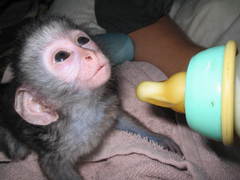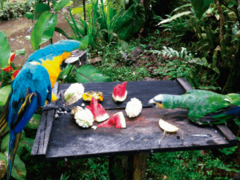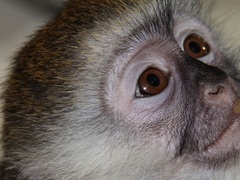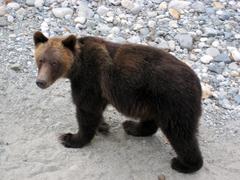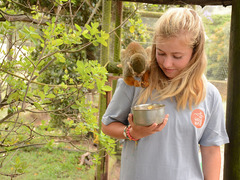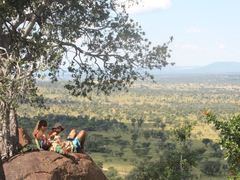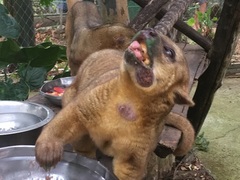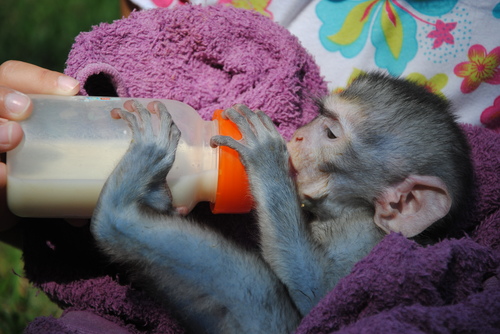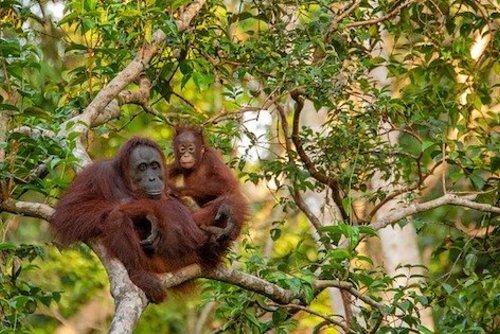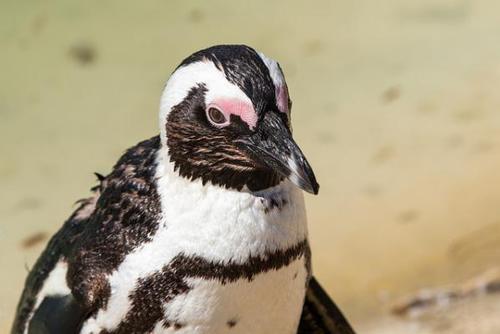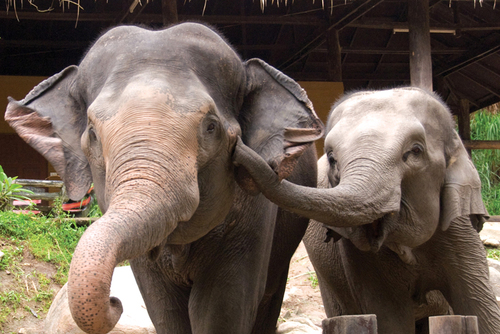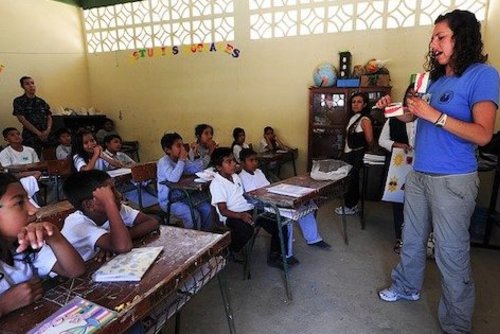Merazonia has a young team of people who encourage volunteers to help think of ways we can improve the park. We are currently caring for well over 100 animals, including: capuchin, tamarin, red howler and woolly monkeys; many species of parrots and macaws; kinkajous and other small mammals such as sloths; and felines.
Because rehabilitation is an important part of what we do, the group of animals we look after often changes, with animals being released or moved to other refuges, depending on the care and environment they need.
In general we have around 10 to 15 volunteers from all over the world at any one time.
Rehabilitation
Volunteering with animals comes with responsibility. Merazonia has a strict hands off policy for most of its animals! As we try to focus on rehabilitation, it is very important to minimize any human interaction with the animals, as this is the first vital step towards their rehabilitation. Some baby animals do need a surrogate mommy or daddy before being introduced to excisting groups. And animals that are too imprinted to be released, such as our kinkajou Whistler, or our macaw Malcolm also receive and enjoy some extra human attention.
Animal Care
Animal care is rewarding work but certainly not a picnic in the park. We feed the animals three times per day. The feeding rounds take between 2 to 3 hours each time. In the morning, we gather at 7:30 a.m. to prepare the animals’ food, and then we divide into groups to clean different animal cages and feed the animals.
Park maintenance
After the feeding, we take time to prepare breakfast and get ready for the rest of the day. Some people will feed the parrots and nocturnal animals, while others are on projects such as animal life enrichment, general park maintenance and chores.
Lunch is around 1:30 pm. We gather to feed the mammals again at 3 pm, after which there is time to hang out with other volunteers, enjoy the scenery, swim at the waterfall or river, or relax in a hammock.
Volunteer's work
Volunteers work 5 1/2 days per week, alternating free days. Sundays are so called ‘lazy Sundays’ in which we feed the animals only once a day and do chores, but no other work is done, leaving plenty of time to relax or enjoy the surroundings.
Jungle abode
Most volunteers stay in our 6-sided jungle abode, which consists of a large dorm-style room, housing up to 11 volunteers. When staying longer there might be a cabin available too. There is also a large deck area where we usually eat our meals, relax in hammocks, or strike up a game of cards. Our bathroom facilities are next to the volunteer house, and consist of composting toilets and our famously hot showers.
People make their own breakfast and lunch, but take turns in preparing the communal dinner.
Requirements
In the meta sense: flexibility, a sense of humour, and a love for animals and the outdoors. You will need to have a basic level of fitness, as most work is physical, walking up and down the jungle surroundings. Knowledge of English and/or Spanish is required.
The minimum age requirement is 18 and the minimum stay is two weeks, although people coming for four weeks or more take preference. In June and July there is a minimum requirement of 4 weeks. We prefer volunteers to arrive on Mondays and Thursdays, between 4 and 6 p.m.
Volunteer fee
Merazonia does not receive any government funding. For the wellbeing of the animals we do not receive tourists in the centre either. Therefore we depend on volunteer fees to cover the basic costs of running the centre. Currently, this fee is $140 per week for the first two weeks, which covers lodging and food. It also includes a contribution to medical supplies and animal food. For those staying longer, the fee for weeks 3-6 is $120 per week and every week thereafter, the fee is $90 per week.
Be prepared
In the Amazon, the weather runs from brilliantly sunny to downright wet (it is the rainforest), so we recommend raingear and clothes you can layer (and liquorice or chocolate if you really want to get in good with the managers). We provide gum boots and working clothes, as well as linen and blankets. If you are prone to chilliness, we recommend bringing a sleeping bag for extra comfort. There is no electricity in the centre but we provide candles. A flashlight or headlight is necessary for the dark jungle nights.
Long-term
The longer people stay, the smoother the centre runs. That is why our fees are lower when more time is spent at the centre. Occasionally we have openings for long-term volunteers to help us with training new volunteers and the day to day running of the park. People who we have worked with before, or have been here for a while, take priority.
Getting there
We live at the reserve, which is a 15-minute taxi ride from the town of Mera. Any bus towards Puyo will pass by Mera's central square from where you can take a green and white pickup taxi, called Transmera to the centre.


